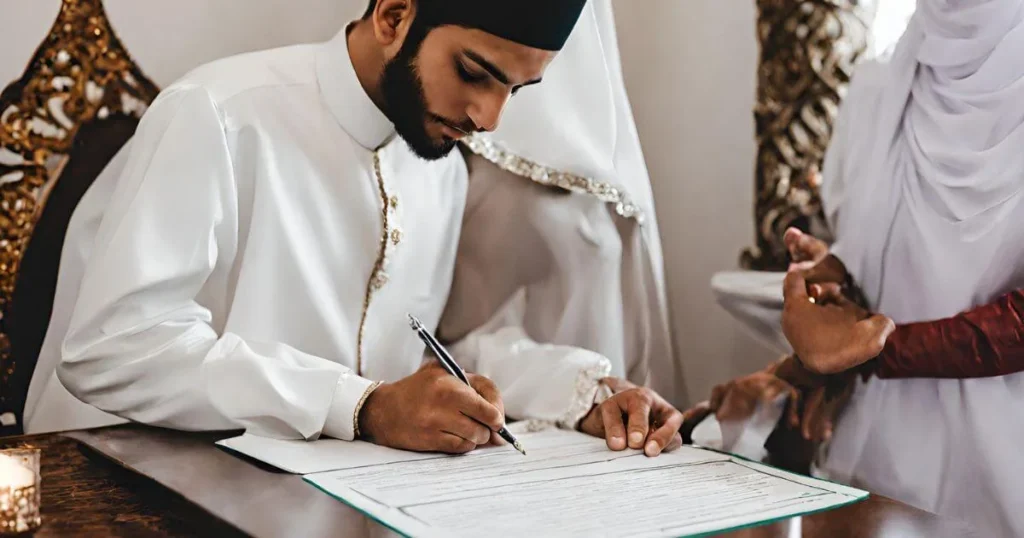
Nikah in Islam A Comprehensive Guide
Introduction
Nikah, sometimes known as “Islamic marriage,” is a revered and essential Islamic ritual. It represents the joining of two people in a lifetime commitment to starting a family and carrying out their social and religious obligations.
Exploring Nikah Meaning
“Marriage” in English is equivalent to the Arabic word “Nikah.” However, the significance of it goes beyond a couple saying their vows. In Islamic religion, a sacred agreement that creates a moral and legal union between a man and a woman is referred to as nikah. It is fundamental to a loving, devout family and consists of obligations, rights, and mutual consent.
Nikkah is important to Islam because it fulfills the fundamental human need for companionship and preserves the moral and ethical principles outlined in the Quran and Hadith (the sayings and actions of the Prophet Muhammad, Peace Be Upon Him).
What is Nikah in Islam ?
Islam’s teachings are based on the concept of Nikah, which Allah considers to be among the highest moral acts. It is a means of upholding the values of love, compassion, and support among family members while defending people’s chastity and dignity.
Nikah is seen as a good deed in Islamic tradition and has several important components.
Fulfillment of Sunnah
Nikah is seen as a fulfillment of the Sunnah, which are the actions and practices of the Prophet Muhammad (Peace Be Upon Him). The Prophet commended Nikah as a morally upright route and underlined its importance.
Protection of Chastity
Nikah offers an ethical and legal way to fulfil basic human needs, so preserving people’s modesty and chastity.
Preservation of Lineage
Nikah ensures the legitimate lineage of children, a fundamental principle in Islam.
Establishing a Family
The foundation of Nikah is the establishment of a family, which is necessary for the growth and development of a strong and moral community.
Fulfillment of Religious Duties
Nikah is a means of fulfilling several religious duties, including providing for one’s spouse, raising children in an Islamic setting, and ensuring that faith is practiced in the home.
Nikah Requirements
In Islam, nikah is a solemn contract that needs to fulfill a number of prerequisites in order to be deemed legitimate and enforceable. While these specifications may fluctuate significantly throughout Islamic legal institutions, they usually consist of the following.
Mutual Consent
Both the bride and the groom must willingly and fully cooperate for the marriage to succeed. It is absolutely forbidden to utilize pressure or force in Islam.
The Mahr (Dower)
As a token of his devotion and accountability, the groom is expected to give the bride a gift or monetary sum known as the Mahr.
Witnesses
The Nikah ceremony must have two adult, mentally sound Muslim witnesses to validate the contract. These witnesses are typically responsible for verifying the consent of both parties.
Offer and Acceptance
The groom offers the marriage contract, and the bride accepts it. Usually, both parties speak a formulaic remark to accomplish this.
Wali (Guardian)
The bride must have a Wali, a male guardian, to represent her interests during the Nikah ceremony. The Wali can be her father, brother, or another close male relative.
Public Announcement
The marriage is publicly publicized and the Nikah ceremony is usually performed in a public setting, such as a mosque.
Islamic Officiant (Qadi or Imam)
A certified Islamic authority, such as an Imam (a religious leader) or Qadi (an Islamic judge), officiates the Nikah ceremony.
Marriage License
Local laws in many countries require a valid marriage license in order to validate the Nikah contract.
Nikah Contract
Nikah, or marriage contract, is regarded as a holy covenant in Islam. Since both parties have been given specific obligations to fulfill towards one another in an honest and sincere manner towards God, the Qur’an refers to this as a “serious contract.”
Nikah Nama
To legally become married, two Muslim partners entering into a civil union must sign a written document called a nikah nama.
Nikah Mubarak Meaning
Marriage in Arabic is referred to as nikah. In Islam, “Nikah Mubarak” is used to wish a happy life to the newlywed couple and to send wedding wishes.
Muslim Nikah
The Islamic marriage contract is called the Nikkah.
Nikah Certificate
A legal and religious document known as an Islamic marriage contract, or nikah contract, establishes the guidelines for Muslim marriage. It’s a contract that the bride and groom sign to ensure that their marriage adheres to Islamic values.
What is a Nikah?
Nikah is a contract that only a man and a woman can sign. It is expected that the bride and groom will freely consent to their marriage. A formal, enforceable contract that specifies the rights and obligations of the bride and groom is thought to be essential to an Islamic marriage that is recognised by Islam, whether it is written down or spoken.
What is a Nikah Ceremony?
The Islamic marriage ceremony, in which the Muslim couple signs the marriage contract in front of an imam and two witnesses, therefore obtaining divine legitimacy for their union.
Dua for Nikah
بَارَكَ اللّٰہُ لَكَ وَبَارَكَ عَلَيْكُمَا وَجَمَعَ بَيْنَكُمَا فِي خَيْرٍ
Dua for Nikah in English
Allah bless you and shower blessing on you and place goodness between both of you.
Conclusion
In Islam, nikah is a deep and holy pact that unites a man and a woman in a lifetime of marriage. It is a way to uphold people’s religious and moral obligations, protect their dignity, and create solid, morally grounded families. The conditions and prerequisites for Nikah uphold the principles of love, compassion, and mutual consent that are important to the Islamic institution of marriage, guaranteeing the legality and enforceability of the agreement.
FAQS:
Islamic marriage is referred to as “nikah.” While both titles refer to the idea of a formal union between two people, “Nikah” is often connected to Islamic matrimonial customs.
The bride and groom formally accept the provisions of the marriage contract, which usually include the dowry (mehr) and other requirements, during the Nikah ceremony.
The rules of Nikah vary in accordance with Islamic jurisprudence and cultural practices, but they generally involve the consent of both parties, witnesses, and the recitation of marriage vows.
Share on >>
